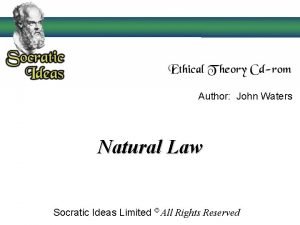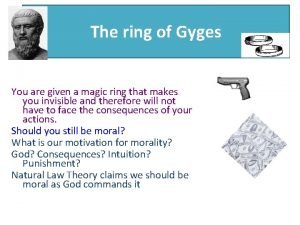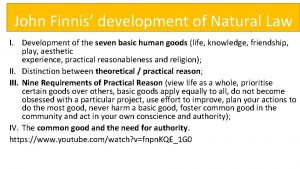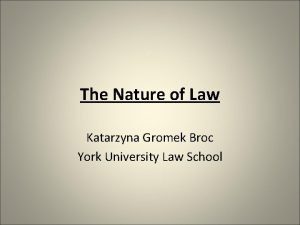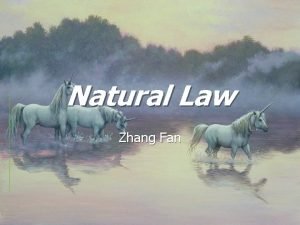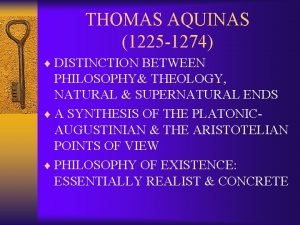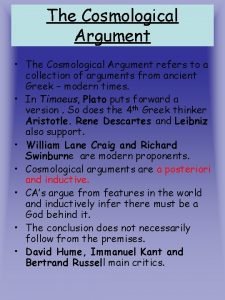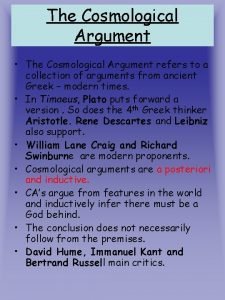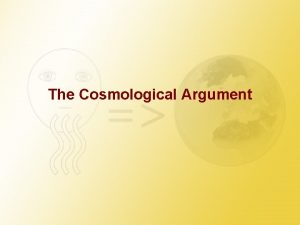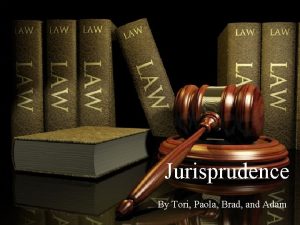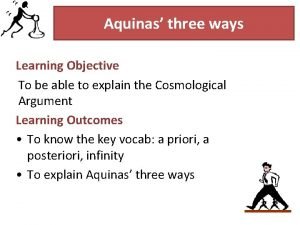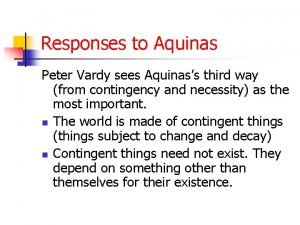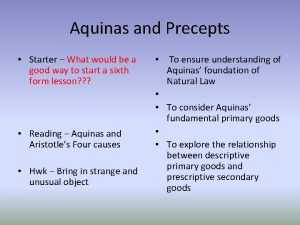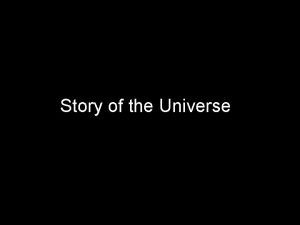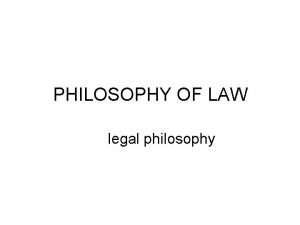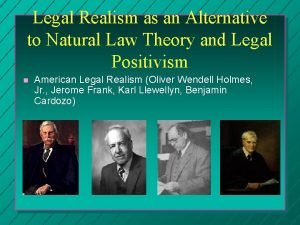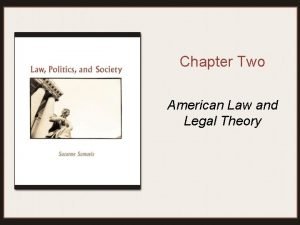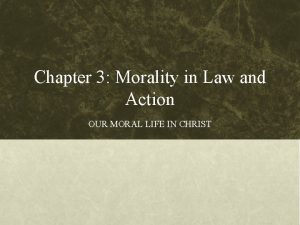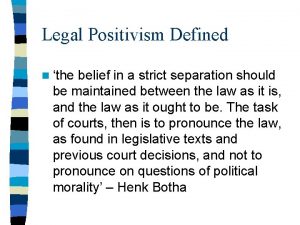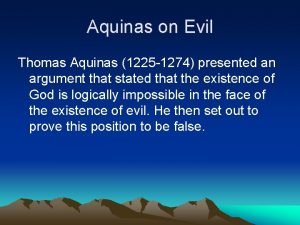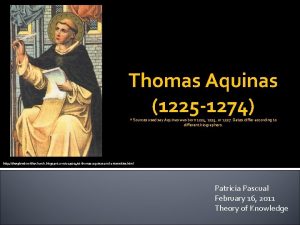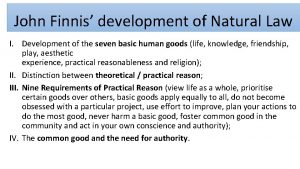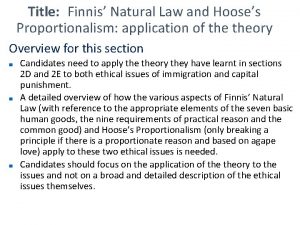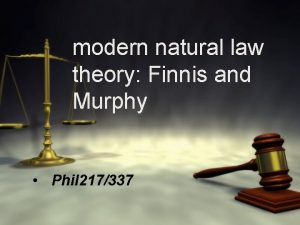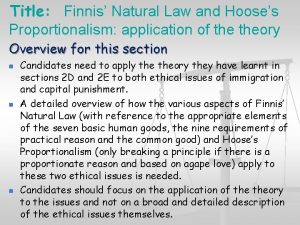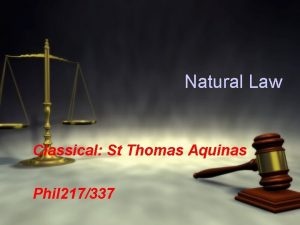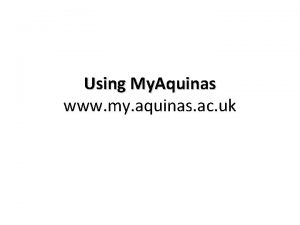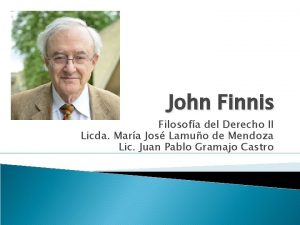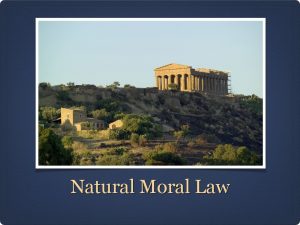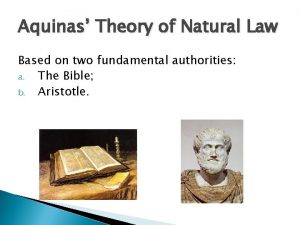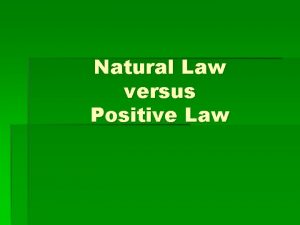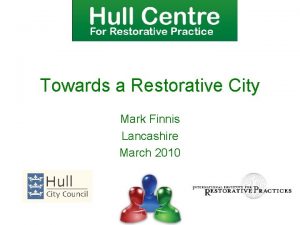NATURAL LAW John Finnis ST THOMAS AQUINAS 122474






























- Slides: 30

NATURAL LAW John Finnis

ST. THOMAS AQUINAS (122474) Four Categories: Eternal law- God’s rational guidance of all creatures. Divine law –that part of law manifested through revelations in the Christian scriptures. Natural law – participation of rational creatures in the eternal law through the operation of reason. Human law – derived from both divine law and natural law. This law may be variable in accordance with the time and circumstances in which it is formulated, but its essence is to be just.

JOHN FINNIS (PLAY) John Finnis is an Australian legal scholar who grew up in Adelaide before getting a Rhodes scholarship to Oxford. He is currently professor of law at Oxford. Deontological / Absolutist Finnis published Natural Law and Natural Rights in 1980, and the book is considered a seminal restatement of the natural law doctrine. Finnis is a practising catholic, and a fair proportion of his work (in NLNR and subsequent articles) deals with the relationship between natural law and Christian/Catholic values.

BACKGROUND • New Classical Natural Law Theory: Tries to offer a neo. Aquinian natural law philosophy which does not assume a divine being. • Finnis approaches Natural Law in the same way as Aquinas – a type of moral theory not a type of legal theory - The main difference: without the need for God. • Instead of speaking about the form of the good or seeking the good he speaks about human desires to pursue basic goods in life. • Finnis articulates ‘a theory of moral action for our day’, a theory of how to live well! • He emphasises that all people have the ability to understand basic moral obligations and that these moral obligations apply to all.

JOHN FINNIS PLAY “Natural law is a set of principles of practical reasonableness to be utilized in the ordering of human life and human community in the process of creating optimum conditions for humans to attain the objective goods. These conditions constitute the ‘common good’. Finnis lists seven objective goods which he regards as being irreducible basic”. Read the sheet on John Finnis pair up be prepared to feedback

JOHN FINNIS DIFFERENCES John Finnis Aquinas

The seven goods are all equally fundamental, and do not exist in a hierarchy. Therefore, although some acts are wrong (because they do not participate in a basic good), there is no single correct act. This is an important distinction between theoretical and practical reason: in theoretical reason, if two statements contradict then at least one of them must be false In practical reason, there can be two contradictory acts that are both morally correct choices. It is up to a human’s free will to choose which act they

BASIC GOODS…(PLAY) Finnis defines Natural Law as requiring … ‘a set of basic practical principles which indicates the basic form of human flourishing as goods to be pursued and realised, and which are in one way or another used by everyone who considers what to do. ’

WHERE DO THESE GOODS COME FROM? We can distinguish between theoretical reason, which describes what is true, (with practical reason, which describes how to act). Theoretical reason has many principles that cannot be proved, such as: §the validity of deductive inferences §the principle of induction §the assumption that experience corresponds to reality §the preference for a simple explanation over a complex one

THEORETICAL / PRACTICAL REASON 1) ‘theoretical reason’ – which covered maths and logic And 2) ‘practical reason’ – superior as it can lead to people becoming ‘moral/good people’. ‘practical reason’ is also grounded in the sense of ‘ought’. By careful consideration and weighing of the facts people will become aware of what they ought or ought not to do. Thus ‘ought’ implies ‘can’! We will never have a sense of ‘ought’ about things we cannot (or should not) do.

THE COMMON GOOD AND THE NEED FOR AUTHORITY Humans naturally need to live in groups. This is both required expressly by the basic good of Sociability, and implicitly by all the other goods, because we are most productive when we are working together. Hence, one of the nine requirements of practical reason is ‘Contribute to the common good. ’ The common good is the situation where each member of the community can effectively pursue the basic goods for themselves.

FINNIS - THE 'BASIC GOODS' OF LIFE • This theory is based on the belief that mankind sets out to obtain things they perceive to be good for themselves. • Man must exercise practical reason to obtain that good. • Finnis isolates seven of these goods which, according to him, cannot be broken down any more and so refers to them as 'basic goods' in life. These goods are fundamental and do not derive from other goods. • They are goods which for most people make life worthwhile and according to Finnis are self-evident (obvious). • The key moral principle holds that it is always wrong to intend to destroy a basic good (see Finnis 1980: 118 -23). So, for example,

Principles like these cannot be derived from the principles of logic, and can be meaningfully denied. But if you deny a principle like this, you will find it impossible to pursue knowledge and you won’t be able to get anywhere at all. Moreover, you can just see that these principles are true by looking around. The basic (seven fundamental)goods are the same. They cannot be derived from God’s law, or logic, or the inclinations of a human brain. But if you deny them, you cannot get anywhere in the realm of practical reason, and you cannot make decisions about what is best for your life. And, just with theoretical principles, it’s obvious that these goods are basic. In this way, the seven basic goods are self-evident. It is important to make a distinction here. It is not true that everyone is automatically aware of all the principles of theoretical rationality – a toddler may not understand a argument. But such principles are known to every educated, mature person. In the same way, Finnis acknowledges that there are people who do not respect the basic goods; it’s just that those people are wrong.

THE REALITY OF THE BASIC GOODS THE STATEMENT ‘THESE ARE THE SEVEN BASIC GOODS’ IS JUST AS TRUE AS THE STATEMENT ‘THERE ARE INFINITELY MANY PRIMES. ’ THE BASIC GOODS EXIST INDEPENDENT OF HUMAN THOUGHT, AND SO WE CAN PUT THEM IN ‘REALITY’ IN THE SAME SENSE THAT MATHS LIVES IN REALITY. THE BASIC GOODS, OF COURSE, DO NOT HAVE PHYSICAL FORM, FORM BASIC GOOD

SEVEN FUNDAMENTAL ‘GOODS’ FOR HUMANKIND The basic goods serve as an explanation of why we do things. Any worthwhile activity is worth doing because it participates in one or more basic goods. Other positive qualities, like freedom or humility, are merely methods by which we can achieve one or more of the basic goods. Other motivations for action, such as the pursuit of pleasure or material gain, are misguided and motivated by human inclination rather than practical reason.

THE SEVEN BASIC GOODS: THE CENTRAL OBJECT OF FINNIS’S THEORY IS A SET OF SEVEN FUNDAMENTAL ‘GOODS’ FOR HUMANKIND. P Life Knowledge (for its own sake) Friendship and Sociability Play (for its own sake) Aesthetic Experience A R K L F P Practical Reasonableness, i. e. the ability to reason correctly about what is best for yourself, and to act on those decisions. Religion i. e. a connection with, and participation with, the orders that transcend individual humanity

JOHN FINNIS: 7 “BASIC GOODS” THAT CONTRIBUTE TO A FULFILLING LIFE: 1. Life- the first basic value; 2. Knowledge- a preference for true over false believe; 3. Play- performance for the sake of it; 4. Aesthetic experience – the appreciation of beauty; 5. Friendship or sociability – acting for the sake of one’s friends’ purpose or well being; 6. Practical reasonableness – the use of one’s intelligence to choose actions, lifestyle, character, etc; 7. Religion – the ability to reflect on the origins of the cosmic order and human freedom and reason.

THE NINE REQUIREMENTS OF PRACTICAL REASON One of the seven basic goods is practical reason. You participate in this good by making rational decision that maximise your participation in the other goods – by choosing good projects to pursue, by making moral decisions, and so on. In order to correctly participating in practical reason, you need to fulfil nine sub-requirements. These requirements are self-evident in the same way that the basic goods are self-evident.

THE NINE PRINCIPLES ARE: 1. You should view your life as a whole, and not live moment to moment 2. You naturally have to prioritise certain goods over others (e. g. an academic would prioritise knowledge higher than a milkman), but you should always do so with good reason. You should never arbitrarily discount one of the basic goods. 3. Basic goods apply equally to all people. You can be selfinterested to the extent that you are in the best position to look after yourself, but you should always take into account the good of others. 4. You should make sure that you do not become obsessed with a particular project, and keep the perspective that the project is a participation of a basic good.

THE NINE PRINCIPLES ARE: 5. You should actually do projects and make an effort to improve – don’t just sit around or repeat old habits. 6. You should calculate and plan your actions so that they are the most efficient (in a utilitarian sense) and do the most good. 7. You should never commit an act that directly harms a basic good, even if it will indirectly benefit a different basic good. For example, you should not kill even if it will indirectly save more lives later. 8. You should foster the common good of the community. 9. You should act according to your conscience and practical reason, not the authority of someone else.

MAKING DECISIONS USING THE SEVEN GOODS AND THE NINE REQUIREMENTS The seven goods and the nine requirements apply equally to everyone. To make specific decisions in your life, you think reasonably, in accordance with the nine requirements, and decide how you will participate in the basic goods. There is plenty of scope for discretion in this scheme. If you are deciding what to do with your day, you could choose to listen to music, or to go hiking, or to go to a party, or to volunteer for disaster relief. These are all, in principle, valid choices. Some choices are wrong, e. g. murdering someone, or spending all day in an empty room doing nothing, but there are many equally correct choices.

AUTHORITY To best achieve the common good, certain acts need to be performed by the whole community rather than specific people. Examples are respect for the rules of games, collaboration within knowledge, spirituality within the community, or respect for each other’s lives and safety. Such community-wide actions require coordination, and coordination requires authority (not necessarily coercive authority). Such coordinating authorities include churches, team captains, university heads of department, and governments. One of the basic goods is practical reasonableness. It is necessary that every member of a society be able to make decisions for themselves. Authority figures therefore need to compromise between coordinating society effectively, and granting people the ability to pursue their own ends in the manner they choose.

NATURAL LAW: ONE OF THE STRONGEST AND MOST EFFECTIVE SOURCES OF AUTHORITY IS THE LAW, AND THEREFORE, FINNIS CONCLUDES, LAW IS A MORALLY NECESSARY COMPONENT OF SOCIETY. PLAY Some laws directly serve basic goods (e. g. the law against murder). Most laws however, are not so direct – instead they create a stable society in which people have the freedom and ability to pursue the basic goods. Before, I said that each person is free to choose the specific details of how they achieve the basic goods – in the same way, the authors of the law are free to choose the specifics of the legal system. As long as the legal system is in service to the basic goods and in accordance with practical reason, it is a morally ‘good’ legal system.

WHAT FEATURES SHOULD A LEGAL SYSTEM HAVE? The law should bring specificity, clarity and predictability into human interactions, and so it should obey public and precise rules. These rules should also regulate the creation of new rules. Finnis agrees with Lon Fuller’s eight requirements of ‘the inner morality of law, ’ that laws should be: 1. Prospective, not retroactive 2. Possible to comply with 3. Promulgated 4. Clear 5. Coherent 6. Stable enough that people can use the law as a guide 7. The making of new laws should be guided effectively within the legal system 8. People who have authority should be 9. Accountable 10. Consistent and acting in good faith

THE MORAL FORCE OF LAW If you accept a legal system, then you have a legal obligation to obey every law However, a legal system, when implemented correctly, is a very important source of guidance for people, and people have a moral obligation to obey the law. The argument runs like this: ØI ought to pursue the basic goods ØSociety needs to coordinate in order to best achieve the basic goods ØThe law is an effective way of coordinating society this way Therefore : I ought to obey the law. Therefore you have both a legal obligation and a moral obligation to respect and obey the law. The legal obligation is invariant in force – the law just has offences and sanctions; no offence or sanction is legally worse than any other. The moral obligation has different weight depending on the specific offense, because some offences damage the legal system more than others. If a legal obligation is in line with a moral obligation (e. g. ‘Do not murder’) then you also have the non-legal obligation to not perform that act for moral reasons. In this way, the law is not just a coercive order. Certainly, in an imperfect society, the law needs to be coercive in order to regulate people who behave badly. These bad people follow the law in order to avoid sanctions. But many people follow the law because they believe that following the law is morally

AO 2 JOHN FINNIS NATURAL LAW Strengths • His list has a sense of universality ‘All human societies show a concern for the value of human life’ Justifications for killing is needed in all societies Finnis lays the ground work for general moral rules Revival of modern N. L Weaknesses It presumes that the basic goods are self-evident and ignores any idea of a common human nature There is no philosophy of human nature therefore Finnis is not true to Aquinas his theory becomes a ‘christian kantianism’ joseph koterski

GROUP TASK Pupils are to collect information for each area on John Finnis Modern N. L and make own A 3 mind map Back ground/ intro/info Practical reasonableness Nine principles of practical reasonableness Basic goods Seven basic goods Strengths and weaknesses/ evaluation critique


Learning Intention: To understand -John Finnis Natural Law Activity: To Discuss modern day philosophers views of Natural Law I will be successful if I: q. To Discuss John Finnis natural law theory q. To identify John Finnis Natural Law and how it differs to Aquinas Natural Law q. To examine modern theory of Natural Law –John Finnis

A) EXPLAIN JOHN FINNIS DEVELOPMENT OF AQUINAS NATURAL LAW (20) B)THE STRENGTHS OF FINNIS’ NATURAL LAW OUTWEIGH ITS WEAKNESSES (30) Part A Part B
 Thomas aquinas natural law
Thomas aquinas natural law Aquinas natural law essay
Aquinas natural law essay Finnis 7 basic goods
Finnis 7 basic goods John finnis
John finnis Katarzyna gromek-broc
Katarzyna gromek-broc John finnis
John finnis Thomas aquinas epistemology
Thomas aquinas epistemology Descartes cosmological argument
Descartes cosmological argument St thomas aquinas cosmological argument
St thomas aquinas cosmological argument St thomas aquinas cosmological argument
St thomas aquinas cosmological argument Teori politik thomas aquinas
Teori politik thomas aquinas Thomas aquinas miracles
Thomas aquinas miracles Tori and brad
Tori and brad Thomas aquinas facts
Thomas aquinas facts Aquinas learning cycle 1
Aquinas learning cycle 1 Aquinas three ways
Aquinas three ways Aquinas third way
Aquinas third way My aquinas
My aquinas Aquinas precepts
Aquinas precepts Aquinas.org
Aquinas.org Site:slidetodoc.com
Site:slidetodoc.com In aquinas view man's ultimate happiness consists in
In aquinas view man's ultimate happiness consists in Positive law vs natural law
Positive law vs natural law Principles of natural law
Principles of natural law Natural law vs positive law
Natural law vs positive law Legal realism vs natural law
Legal realism vs natural law Positive law vs natural law
Positive law vs natural law Natural law vs positive law
Natural law vs positive law Positivism
Positivism Newton's first law and second law and third law
Newton's first law and second law and third law Si unit of newton's first law
Si unit of newton's first law
